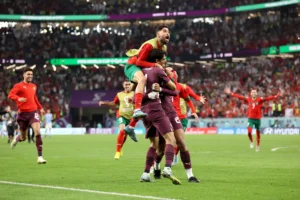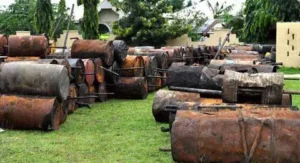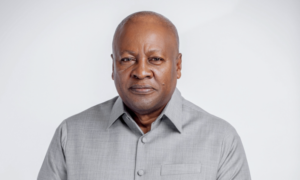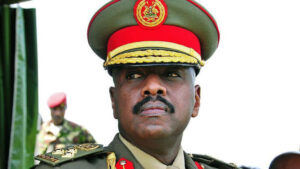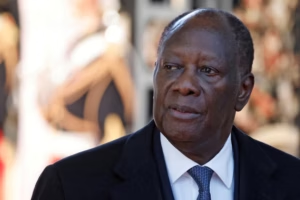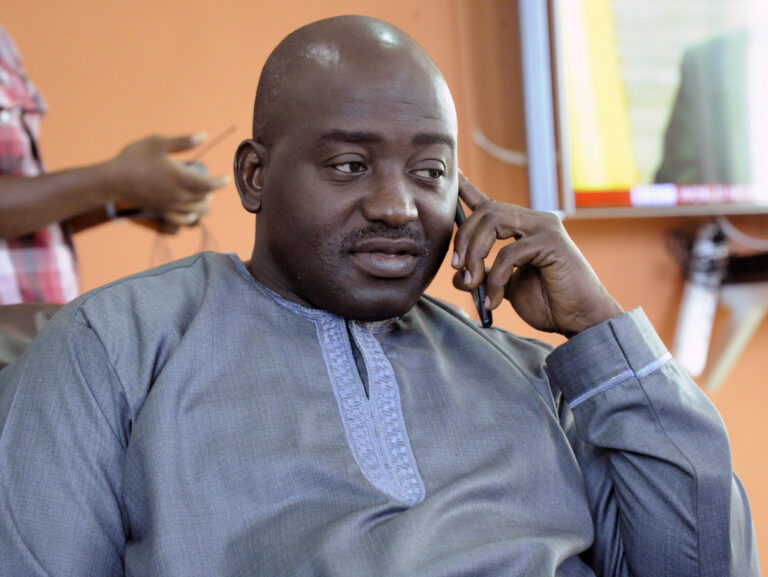
Liberia FA chairman Musa Bility speaks on his mobile phone on June 19, 2015, after annoucing plans to stand for the presidency of Fifa, in the Liberian capital Monrovia. AFP PHOTO / ZOOM DOSSO
Former Liberian Football Association president Musa Hassan Bility, who was banned from all FIFA activities for stealing the organisation’s money meant to save lives in Liberia, has lost his appeal against a 10-year ban.
The Court of Arbitration for Sport (CAS) in Lausanne, Switzerland, earlier this month upheld FIFA’s 10-year ban against Bility and the €455,000 ($500,000) fine. FIFA will reportedly keep the ban in place if he does not pay the fine. The 10-year ban by the world’s football governing body, FIFA, was triggered after the Liberian was found guilty of misappropriation of FIFA funds, although the total monies was not indicated. He was found guilty of conflicts of interest, as well as offering and accepting gifts and other benefits.
Absconding with Ebola funds
Top football stars promoted Ebola awareness measures in November 2014 for FIFA’s ’11 against Ebola’ campaign. Part of the strategy was aimed at preventing the spread of the virus that had already killed more than 11,000 people across Liberia, Sierra Leone and Guinea.
Ebola hit Liberia hard, exposing the fragility of the country’s health sector, resulting in 4,800 deaths, including healthcare workers. This pushed the government to ask for international assistance to fight the outbreak.
FIFA and other countries and institutions responded by buttressing global efforts to limit the spread to the virus, but according to FIFA’s verdict, funding was misappropriated by Bility.
FIFA judges found Bility guilty of misusing other resources sent to the Liberia Football Association and diverting money to businesses controlled by him, although did not indicate the sum. He also received benefits, a conflict of interest and in violation of the FIFA Code of Ethics.
Bility had attempted to run as a candidate to replace FIFA’s disgraced former president Sepp Blatter in a 2015 test, but was barred after failing integrity tests. The role ultimately went to Gianni Infantino.
Football corruption
Corruption is a form of human rights violation, says Anderson Miamen, head of the Center for Transparency and Accountability in Liberia (CENTAL). He stresses that whenever resources meant for public good are misdirected, it affects the population, hence Bility must be held accountable.
Miamen is now pushing for due process in Liberia to ensure Bility is held accountable for his wrongdoings and returns the stolen money to the Liberian Football Authority (LFA).
FOOTBALL FRAUD
Former Liberian Football Association president Musa Hassan Bility, who was banned from all FIFA activities for stealing the organisation’s money meant to save lives in Liberia, has lost his appeal against a 10-year ban.
The Court of Arbitration for Sport (CAS) in Lausanne, Switzerland, earlier this month upheld FIFA’s 10-year ban against Bility and the €455,000 ($500,000) fine. FIFA will reportedly keep the ban in place if he does not pay the fine. The 10-year ban by the world’s football governing body, FIFA, was triggered after the Liberian was found guilty of misappropriation of FIFA funds, although the total monies was not indicated. He was found guilty of conflicts of interest, as well as offering and accepting gifts and other benefits.
READ MORE Liberia: George Weah, more interested in football than the presidency?
FIFA’s Ethics Committee brought down a guilty verdict in February 2019 against Bility after he failed to explain how FIFA funding earmarked to save lives during the Ebola epidemic in Liberia was expended.
During this time, Bility doubled as an executive committee member at the Confederation of African Football (CAF).
Absconding with Ebola funds
Top football stars promoted Ebola awareness measures in November 2014 for FIFA’s ’11 against Ebola’ campaign. Part of the strategy was aimed at preventing the spread of the virus that had already killed more than 11,000 people across Liberia, Sierra Leone and Guinea.
Ebola hit Liberia hard, exposing the fragility of the country’s health sector, resulting in 4,800 deaths, including healthcare workers. This pushed the government to ask for international assistance to fight the outbreak.
FIFA and other countries and institutions responded by buttressing global efforts to limit the spread to the virus, but according to FIFA’s verdict, funding was misappropriated by Bility.
FIFA judges found Bility guilty of misusing other resources sent to the Liberia Football Association and diverting money to businesses controlled by him, although did not indicate the sum. He also received benefits, a conflict of interest and in violation of the FIFA Code of Ethics.
Africa Insight
Wake up to the essential with the Editor’s picks.Sign upAlso receive offers from The Africa ReportAlso receive offers from The Africa Report’s partners
Bility had attempted to run as a candidate to replace FIFA’s disgraced former president Sepp Blatter in a 2015 test, but was barred after failing integrity tests. The role ultimately went to Gianni Infantino.
Football corruption
Corruption is a form of human rights violation, says Anderson Miamen, head of the Center for Transparency and Accountability in Liberia (CENTAL). He stresses that whenever resources meant for public good are misdirected, it affects the population, hence Bility must be held accountable.
Miamen is now pushing for due process in Liberia to ensure Bility is held accountable for his wrongdoings and returns the stolen money to the Liberian Football Authority (LFA).
The ban placed on Bility has reduced media relations for football in Liberia
“The government of Liberia should find a way to engage with relevant international institutions, take hold of the matter and do what’s needed because what we are talking about are public resources,†Miamen says in an interview with The Africa Report in Monrovia.
The CAS sport court’s rejection is now eliciting public calls for Bility to give back the stolen FIFA funds to the LFA, which could use the resources to address some challenges in running the national organisation.
The anti-corruption czar is pushing for further investigation by the Liberian authorities, calling for Bility’s properties to be seized if he fails to refund the money.
Bility owns several businesses in Liberia and is very influential politically. He is running for the electoral district 7 seat in the House of Representatives in northeastern Nimba County.
Reputational damage
The whole Bility scandal has placed a dark cloud over football in Liberia, says Liberian sports journalist Thomas Kojo Roulhac.
“The ban placed on Bility has reduced media relations for football in Liberia, our football boss was linked [to] misappropriating Fifa’s funds. That’s a reputational issue for us and it has a negative impact on our football,†says Roulhac.
He pointed out that the LFA has been entangled in a number of scandals, such as the alleged involvement of some referees collecting kickbacks to influence matches locally and internationally. Liberia’s under-17 team was disqualified from a tournament in Mauritania in 2022 due to some of the players who were 20 years old, not 17.
Liberia’s reputation on the playing field has faltered at a time when the country is being led by former world-class player and Ballon d’Or winner, President George Weah.
FIFA institutes accountability measures
Bility’s misappropriating FIFA’s funds has compelled the global football organization to put robust measures in place to ensure accountability.
FIFA “is doing fact checking behind money sent to the LFA here. Every time they send in money, they send their own people [auditors] to make sure the money is used properly. The mini pitches you see constructed by FIFA here, they ha[ve] their own people on ground to ensure value for money and avoid the Bility sagaâ€, Roulhac says.
Failing to ensure Bility is made to pay back the stolen money will show to the rest of the world that Liberia is not serious about fighting corruption, least to say lifting its people out of poverty, Gormah Weedor, 34, a football fan, tells The Africa Report.
“Our friends from the international community will see Liberia as a hub for impunity, meaning people who commit crimes run here for rescue because we have failed as a country to fight corruption just as the US ambassador said recently about our health sector,†she says. This was in reference to US ambassador Michael McCarthy’s comments on how money earmarked by the government for national hospitals never received the funds.
The Africa Report contacted Musa Bility for this story, but he declined to be interviewed for this article.


